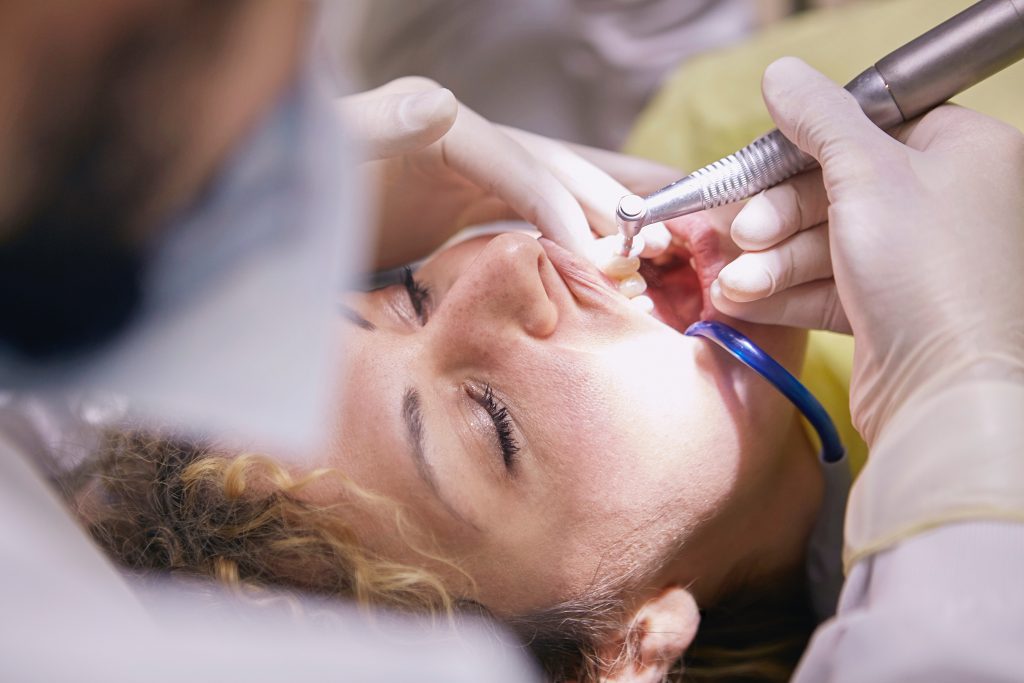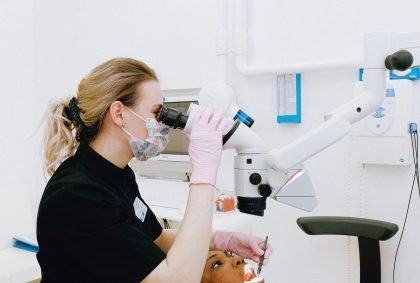The World Dental Federation has presented the current definition of oral health. It reads: “Oral health is an integral part of overall health and well-being.” Thanks to a healthy mouth, you can freely communicate, smile, express emotions, smell, taste, touch, chew food, and swallow it. However, this is also something more, according to the definition of the World Dental Federation. Oral diseases affect interpersonal relationships, leading to avoidance of social contact, even social isolation, and also increase the risk of diabetes, heart disease, pancreatic cancer, pneumonia, and other systemic pathologies
Therefore, today oral health is viewed not only in terms of a beautiful smile, but also of well-being and overall health!.
Why is it worth visiting the dentist?
Dental examination should be performed regularly in children every 3 months, in adults every 6 months. The dentist may recommend shortening or lengthening these periods, depending on the condition of the patient’s oral cavity. Regular checkups will help you keep your teeth healthy for many years.

Regular visits by children are especially important . A dentist can make friends with a small patient, assess the hygiene and condition of milk teeth or emerging permanent teeth. Early detection of unfavorable habits of a child (sucking a pacifier, a finger, taking air with the mouth, not with the nose, etc.) will allow for quick treatment by eliminating dysfunctions and parafunctions, using simple exercises or orthodontic appliances.
The dental examination also allows for the assessment of personal oral hygiene, verification of the effectiveness of brushing and flossing, giving instructions and determining the best method of tooth cleaning. Your dentist may recommend changing the toothpaste or using an appropriate toothpaste rinse adapted to the patient’s needs. If the plaque is not removed regularly, it hardens and tartar is formed . It is the cause of periodontal diseases, but also contributes to the development of caries in the teeth (it is in the plaque that cariogenic bacteria live and multiply). Hard plaque cannot be removed with a regular toothbrush. Professional cleaning is essential here using an ultrasound machine in a dentist’s office.
Systematic visits give the dentist a chance to check the oral cavity , early detection of caries and, consequently, early treatment of the tooth, which reduces further tissue damage and ensures easier, less invasive, and thus cheaper dental treatment. Sometimes it is necessary to perform a diagnostic X-ray, which, apart from caries foci, helps to detect possible pathologies in the tissues around the tooth located in the bone.
Treatment of periodontal diseases is the more effective the earlier it is detected. Prophylaxis of periodontitis (hygiene instruction, professional tooth cleaning ) may prevent the disease from fully developing and irreversible damage.
Visits to the dentist’s office are also necessary when the patient no longer has his own teeth. During the use of dentures, the base in the mouth changes and the dentures no longer fit. Mismatched dentures cause pressure sores, prevent proper biting and chewing, and disrupt proper speech. Regular visits to the dentist will enable the relining (“renewal”) of the prosthesis, detection of abnormalities in the occlusion and will give the doctor a chance to assess the oral mucosa under the prosthesis.
Prophylactic examination of the oral mucosa, tongue, and throat performed by the dentist during the follow-up visit will allow for the possible detection of neoplastic lesions that are fully curable at an early stage. Oral cancers are usually painless, therefore patients are not aware of this serious disease for a long time.
SANDBLASTING TEETH
Over time, a deposit builds up on the surface of the teeth, which causes unsightly discoloration. This deposit can be removed by a dentist during the sandblasting procedure. Teeth sandblasting is performed depending on the individual needs of the patient, e.g. every few months. Removing plaque from the teeth, in particular from hard-to-reach places, gives the teeth whitening effect, prevents the multiplication of bacteria, and consequently prevents caries and periodontitis. We recommend sandblasting to heavy smokers, people who drink a lot of coffee, tea and patients who wear orthodontic appliances.
The procedure is carried out using a sandblaster – a special device that directs a stream of dental sand onto the teeth. Sandblasting prepares teeth for whitening and complements the treatment of tartar removal (scaling).
After professional tooth cleaning, which includes sandblasting and scaling treatments, we protect the teeth with a special varnish in order to strengthen the tooth enamel and to better protect the teeth against caries.
